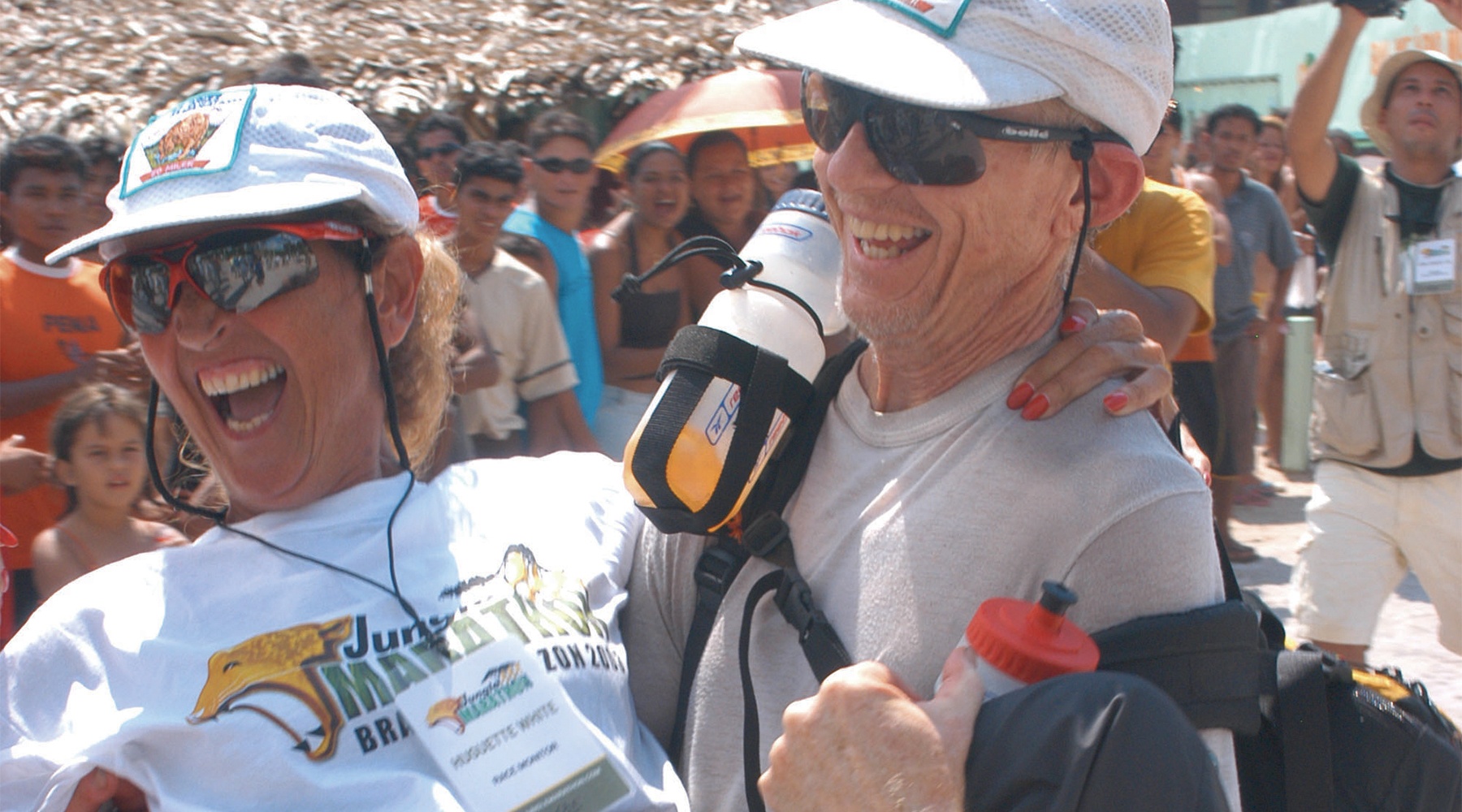That scene alone would be quite memorable to most who witnessed it. (Think Richard Gere and Debra Winger in the final moments of An Officer and a Gentleman.) But there are two factors that make it even more so.
First, the races Brenden runs are not mere 5-kilometer affairs. Or even marathons. You see, Brenden is an ultra-marathoner. That means that by the time he’s done, he may have covered 100 miles or more. And the race courses are not usually of the paved variety; Brenden and White travel the world so that he can trek for up to a week across the sand dunes of the Sahara Desert or through the rainforests of Brazil.
Plus, White is pretty unforgettable herself. Some of that comes from what she possesses: an ever-present smile and a cheerleader’s seemingly endless supply of energy. But a big part of what makes her memorable is what she doesn’t possess—a left leg.
In 1954, White’s doctor diagnosed the ache above her left knee as Ewing’s sarcoma, a rare and deadly cancer of the bone. She traveled from her native Lebanon to OMRF’s research hospital, which was internationally recognized for its work on childhood cancers. Surgeons determined that amputation was the only way to save her life.
With White’s mother translating, Hugh Payne, OMRF’s general manager, delivered the news. White broke down sobbing. When Payne explained that her leg would be used for research to try to save others just like her, the teen dried her eyes. “If it’s going to help people, okay.”
After the surgery, White spent the next three months in OMRF’s research hospital, recuperating and undergoing therapy. OMRF’s doctors and nurses assisted her as she adjusted to the challenges of living with just one leg, and they also helped teach her English, which she speaks fluently today.
“You’d think that I would have been traumatized by it all, but it’s just the opposite,” says White. “It’s a beautiful memory for me, and I am so grateful to everyone at OMRF. It completely changed my attitude and made me a better person. Even my loss from cancer didn’t compare to what I gained from my time at OMRF.”
White is not alone in finding a silver lining in her fight against disease, says OMRF President Stephen Prescott. “It’s surprising, but a bout with cancer can be a positive experience. Regardless of how serious the case or how difficult the treatment, people can remember a battle with cancer as a special time. Often, it shapes who they become later in life.”
For White, this meant focusing on the good things—a move to Oklahoma, marriage and the birth of her daughter, Kathy. She kept her outlook positive, even when the cancer returned and forced a series of debilitating treatments. Even when her husband died in an automobile accident, leaving her to struggle as a young, single mother.
“Mom refuses to remember the bad things,” says Kathy Joseph. “It’s her survival technique. And because of it, she affects every person she meets. Mom says, ‘I love you,’ to everybody, and she’s completely sincere … It’s that unselfish love of hers that keeps her going and makes her so incredibly alive.”
Alone in a foreign country with a young daughter, White scraped together funds to pay the bills. She raised Kathy. She became a grandmother.
When she met Brenden, she even took up running herself, covering one- and two-mile courses in the mountains near her Phoenix home. But physical ailments continue to plague her.
Her lungs remain vulnerable to pneumonia and other ailments, due to the aggressive treatments doctors used years ago. Diabetes and heart issues are constant concerns, and she occasionally suffers from shingles. In the past year, she’s had surgeries for kidney stones, a torn meniscus in her knee and, most recently, a partial knee replacement.
Now 76, she’s kept cancer at bay for more than six decades. When one of her surgeons recently learned that she’d suffered from Ewing’s sarcoma, he was amazed. “He said I was ‘history standing there,’” recalls White. “I was the oldest survivor he’d ever seen.”
The threat of recurrence will always lurk, and her physicians are currently monitoring a nodule that has appeared on her lungs. Yet White refuses to let the illness chart the course of her life.
Brenden is planning to run across the U.S., and White will accompany him. In each town, as she always does when he runs, she’ll act as his support crew, offering water, fluids and her signature cheer: “Go get ’em, Dan! You can do it!”
Although she can no longer run herself, White loves watching Brenden’s races. “It’s wonderful to see that strength, both physical and mental. The body is so strong. It’s amazing what people can accomplish.”
Of course, White isn’t talking about herself. But she might as well be. The race of life has been a long, hard one. But there’s no quit in her. “No matter how bad it seems,” says Kathy, “Mom never, ever gives up.”



